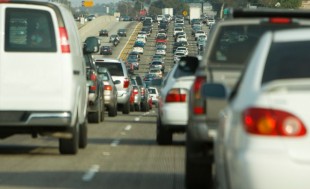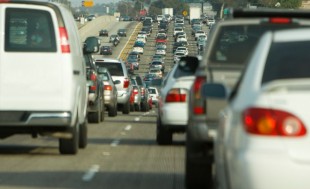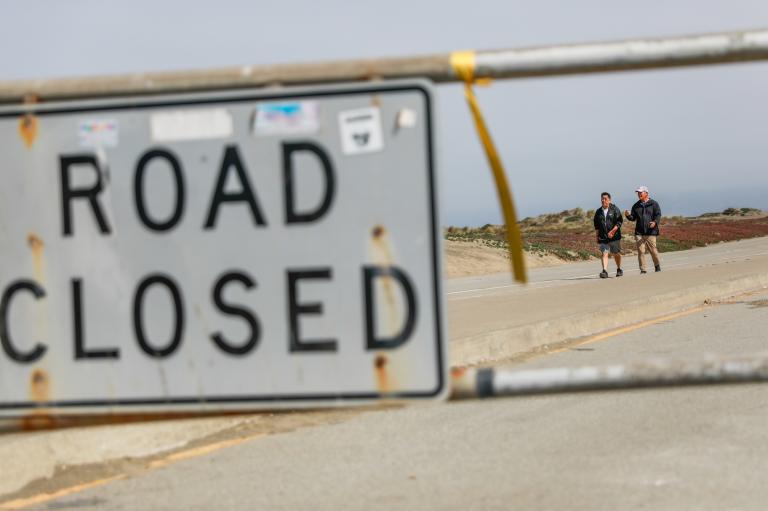 Car commutes sap your life force — that’s common knowledge. But can you quantify exactly how much, and how quickly? The Texas Transportation Institute at Texas A&M University can. It’s just released its annual Urban Mobility Report, which includes data on how much time, money, and mental health urban-area car commuters lose to congestion every year.
Car commutes sap your life force — that’s common knowledge. But can you quantify exactly how much, and how quickly? The Texas Transportation Institute at Texas A&M University can. It’s just released its annual Urban Mobility Report, which includes data on how much time, money, and mental health urban-area car commuters lose to congestion every year.
D.C. and Chicago are most congested: By the “years delay per auto commuter” index, which is the one you’ve most likely seen reported, the D.C. metro area and Chicago are worst off. This is a measure of the difference in travel time between congested and free-flowing conditions, and its yearly cumulative effect on each private-vehicle commuter [PDF].
Chicagoan and Washingtonian car commuters lose 70 hours of their lives to rush-hour traffic every year. That’s not how much time they spend in a car — that’s how much longer they spend in a car than they would under better traffic conditions. The next most put-upon drivers are those in L.A. (63 hours) and Houston (58). Let’s hope they have Rosetta Stone CDs or something.
Congestion costs money: Between the value of their time and the excess fuel consumption from their extra hours on the road (57 extra gallons for pack leader D.C., 39 on average), car commuters are paying good money for the privilege of a frustrating drive. The average cost to all commuters was $808, and the average over 15 very large metro areas was $1,166. Chicago car commuters threw away $1,738 in time and fuel. For that kind of cash, you could buy a decent horse, which would probably get you to work quicker.
Congestion costs more than money: First of all, the environmental effect of all of this congestion is downright gross. From the TTI press release: “The total amount of wasted fuel in 2009 topped 3.9 billion gallons — equal to 130 days of flow in the Alaska Pipeline.”
The UMR also included a “commuter stress index” [PDF]. We wouldn’t put too much stock in this number as a psychological measure — it’s actually just another way of quantifying how bad rush hour really is. But it’s definitely true that being stuck every day in a sluggish line of can’t-drive assclowns wears on you. Using “stress index” as shorthand for “sheer brain-horror of rush hour driving index” just makes sense.
Public transportation helps, a lot: The researchers estimated that the extensive public transport system in runaway leader New York saved commuters almost $9 billion and over 350 million potential lost hours [PDF]. But the time and money savings in runner-up Chicago lagged way behind, and savings in Washington D.C., with its perpetually ailing Metro system, were below average.
On the whole, public transportation made a huge difference in alleviating the money and time cost of congestion — it saved commuters 785 million hours and 640 million gallons of fuel over the year, for a total of $19 billion. Improvements in road efficiency (i.e., road changes that aren’t just more roads) helped only half as much. Imagine the savings if the Chicago and D.C. subway and bus systems served commuters even half as well as New York! For our money, that’s the most interesting part of the report.
The solution is less sprawl, not more roads: The keenest criticism of the report is that it unjustly penalizes densely-packed cities, which are better than sprawly ones in basically all other ways. Greater Greater Washington explains:
The TTI report narrowly looks at only one factor: how fast traffic moves. Consider two hypothetical cities. In Denseopolis, people live within 2 miles of work on average, but the roads are fairly clogged and drivers can only go about 20 miles per hour. However, it only takes an average of 6 minutes to get to work, which isn’t bad.
On the other hand, in Sprawlville, people live about 30 miles from work on average, but there are lots and lots of fast-moving freeways, so people can drive 60 mph. That means it takes 30 minutes to get to work.
Which city is more congested? By TTI’s methods, it’s Denseopolis. But it’s the people of Sprawlville who spend more time commuting, and thus have less time to be with their families and for recreation.
So you should take the rankings with a grain of salt. But we’ll co-sign on the general conclusions: Americans spend a metric buttload of time and energy just slogging our way through traffic, and public transportation can help reduce the burden.



